====================
On the First Sunday of Advent, Year B, November 30, 2014, this sermon was offered to the people of St. Paul’s Episcopal Church, Medina, Ohio, where Fr. Funston is rector.
(The lessons for the day, RCL Advent 1B, were Isaiah 64:1-9; Psalm 80:1-7, 16-18; 1 Corinthians 1:3-9; and Mark 13:24-37. These lessons can be read at The Lectionary Page.)
====================
 When Philip told Nathanael that he had found the Messiah and that he was the son of a carpenter from Nazareth, Nathanael’s immediate response was, “Can anything good come from Nazareth?” (Jn 1:46). Obviously Nazareth had a reputation, and not a good one. I often wonder if, as Jesus was making his way through the Holy Land, especially early in his ministry when he wasn’t well-known, people would ask him, “What was it like growing up in Nazareth?”
When Philip told Nathanael that he had found the Messiah and that he was the son of a carpenter from Nazareth, Nathanael’s immediate response was, “Can anything good come from Nazareth?” (Jn 1:46). Obviously Nazareth had a reputation, and not a good one. I often wonder if, as Jesus was making his way through the Holy Land, especially early in his ministry when he wasn’t well-known, people would ask him, “What was it like growing up in Nazareth?”
All of my life, whenever I tell my story to folks, they have asked, “What was it like growing up in Las Vegas?” And I have always answered, “Like growing up anywhere else. Las Vegas, when you get off the Strip, was just like anywhere else. It was hometown America.” Las Vegas at the time was smaller than Medina is today; the population of Las Vegas in the early 1950s was only about 25,000 people.
Although there was an airport by then, visitors to Las Vegas usually either drove across the desert or rode the Union Pacific Railroad. The line from Salt Lake City to Los Angeles went through Las Vegas; the railroad ran through town north-to-south and the business and hotel district now know as “the Las Vegas Strip” grew up parallel to, and east of, the tracks.
That’s the side of the tracks I grew up on; on the other side, “the Westside,” was where black people lived. Whites didn’t go there, and Negroes (as black Americans were then politely called) didn’t come to the east side of the tracks except to work, mostly in low paying service jobs as janitors, maids, cooks, porters, and doormen. Yes, indeed, the Las Vegas of my childhood was hometown America. Just like any other town in this country was, and just like many still are. Need I mention the St. Louis metropolitan area and its suburb of Ferguson? Need I mention the Cleveland metroplex and the westside neighborhood near the Cuddell Recreation Center? Need I mention, even, Medina itself?
Yes, I think I need to. A few years ago, our nation elected a black man to be president and many proclaimed that we now lived in a “post-racial” world, that racism is “so yesterday.” Throughout the whole of Barack Obama’s presidency, however, the rhetoric and behavior of many have demonstrated just how wrong that judgment was. We do not live in a “post-racial” society. The shooting deaths of black men and boys, Michael Brown in Ferguson, MO, John Crawford in Beavercreek, OH, and Tamir Rice in Cleveland, OH, all by white police officers, and the choke-hold death of Eric Garner, a black man in the custody of white officers of the New York Police Dept., together with the perceived failures of the justice system and the social unrest which have followed, have demonstrated just how wrong that judgment was. We do not live in a “post-racial” world.
“Keep awake!” said Jesus, “Keep alert!”
Elsewhere, ISIS in Iraq and the Taliban in Afghanistan murder those who differ from themselves, Jewish nationalists in Israel pass laws denying basic human rights to Palestinian Arabs, and Buddhist monks in Myanmar threaten to kill Muslim children, demonstrating just how wrong that judgment continues to be not only in our own country but throughout the world. We do not live in a “post-racial” world. Racism is not “yesterday;” it is today!
“Keep awake!” said Jesus, “Keep alert!”
Meanwhile, epidemics such as the ebola crisis in Africa have caused social upheaval, ethnic conflict, and calls for borders to be closed and walls to be raised between nations. Really quite silly notions about vaccines have led people to refuse them and diseases once thought nearly eradicated are being seen again, such as polio and bubonic plague.
“Keep awake!” said Jesus, “Keep alert!”
Weather extremes are being felt throughout the world and sea levels are rising threatening populations in low-lying areas in the South Pacific Islands, southeast Asia, various parts of Africa and South America, and even in our own country, and these things seem to be the result of our poor stewardship of the earth’s environment. At least, that’s what the great majority of the world’s climate scientists tell us.
“Keep awake!” said Jesus, “Keep alert!”
Jesus said, “Nation will rise against nation, and kingdom against kingdom; there will be earthquakes in various places; there will be famines . . . Brother will betray brother to death, and a father his child, and children will rise against parents and have them put to death . . . There will be suffering, such as has not been from the beginning of the creation . . . [and] after that suffering, the sun will be darkened, and the moon will not give its light, and the stars will be falling from heaven, and the powers in the heavens will be shaken.” (Mk 13:8,12,19,24-25)) Therefore, “Keep awake!” said Jesus, “Keep alert!”
Are we seeing the end-times? Are these things that are happening – the racial and ethnic conflicts, the wars, the epidemics, the weather crises, the floods – are these those fig-tree signs that “when [we] see these things taking place, [we] know that [the Son of Man] is near, at the very gates”? (Mk 8:29) I don’t think so, but who’s to say? As Jesus made quite clear, “about that day or hour no one knows, neither the angels in heaven, nor the Son, but only the Father.” (v. 32)
So I don’t know if these are the signs of the end, but I do know this, that these are the signs of things that displease God. And when God is displeased, watch out! When God is displeased, God “tear[s] open the heavens and . . . the mountains . . . quake at [God’s] presence.” (Is 64:1) It is when God is angry that stars fall from heaven and the powers of the heavens are shaken. We do not want to face an angry God!
And yet we cannot dismiss God’s indignation. We would like to. We would like to focus only on the loving God proclaimed by Jesus, not that angry God that Isaiah and the Psalmist remind us of. We would like to, but we can’t because when we blind ourselves to the potential of God’s anger, we blind ourselves to the things that provoke God’s anger. We fail to see (and thus to deal with) the racism which is endemic our society; we fail to see (and thus to deal with) our poor stewardship of creation; we fail to see (and thus to deal with) the illnesses and diseases which are pandemic among populations less fortunate than ourselves.
I’ll be honest with you. I don’t want to talk about the shooting of Michael Brown in Ferguson, MO, the shooting of John Crawford in Beavercreek, Ohio, the shooting of Tamir Rice in Cleveland, Ohio, or the chokehold death of Eric Garner in New York City. I don’t want to talk about the response of the justice system to those deaths and whether or not it functioned properly in not punishing, in some way, the police officers responsible for those deaths. I don’t want to.
In the same way, I don’t want to remember that when my father’s client and friend Sammy Davis, Jr., came to Las Vegas to perform in the Strip casino showrooms he was not allowed to enter those casinos through the front door but had to come in through the service entrance. I don’t want to remember that when Louis Armstrong and Duke Ellington played in Las Vegas they were not allowed to stay in the hotels that hired them but had to put up at boarding houses on the Westside. I don’t want to remember that when Cab Calloway played at a casino bar in Las Vegas in 1954 he was refused a drink at that same bar during a break in the performance.
I don’t want to talk about or remember these things and, I suspect, neither would most people in this church this morning. Frankly, a large fraction of the white society in which we live would, likewise, prefer that we not do so. We believe that we enjoy the privilege of not talking about, remembering, or doing anything about those things, that those things really don’t affect us, that they really aren’t any of our business. The families of Michael Brown, John Crawford, Tamir Rice, and Eric Garner, and the communities within which they lived, however, do not have that privilege. Black performers who succeeded Davis, Armstrong, Ellington, and Calloway, who now can enter the casino through the front door, stay in the hotel, and drink at the bar, who are the beneficiaries of the groundbreaking they did, do not have that privilege.
And, truth be told, neither do we. If we do not remember and talk about these things, we will have failed to see and deal with the racism, the conflict, the poor stewardship of humankind that is all around us; we will have failed to follow Jesus’ admonition in today’s Gospel to “keep alert” and to “keep awake.” We will have failed to follow the second great commandment to “love our neighbors as ourselves.” We will have failed to heed to word of God recorded in the law of Moses: “You shall not wrong a stranger or oppress him” (Ex 22:21); “The stranger who resides with you shall be to you as the native among you, and you shall love him as yourself” (Lev. 19:34); “You shall not pervert the justice due to [anyone]” (Deut. 24:17). We simply are not allowed to think of or to treat any human being differently from ourselves. We do not have the privilege not to talk about, not to remember, not to do something about the injustices done to others, whatever their race or color, whatever their religion, whatever their sex or sexual orientation.
Nathanael asked Philip, “Can anything good come out of Nazareth?” The world today is asking, “Can anything good come out of Ferguson? Out of Beavercreek? Out of Cleveland? Can anything good come of the shooting deaths of young black men by white police officers?” I pray that it can: we have had enough of the bread of tears; we have had enough of the derision of neighbors; we have had enough of the laughter of scorn. Some good must come from these things and it must start with our realization that we do not have the privilege to stand by and think these things have nothing to do with us.
We do not have the privilege to think of or to treat anyone differently from ourselves. We do not have the privilege not to talk about, not to remember, not to do something about the injustices done to others. If we do that, we fail to keep alert and to keep awake, and we risk the anger of the God who tears open the heavens and makes the mountains quake.
Are the things we are seeing signs of the end-times? No, I don’t think so. Are they signs to which we need to pay attention? Things we need to do something about? Oh, yes! Very much so!
“O Lord, you are our Father; we are the clay, and you are our potter; we are all the work of your hand. Do not be exceedingly angry, O Lord, and do not remember [our] iniquity forever.” (Is 64:8-9) “Restore us, O Lord God of hosts; show the light of your countenance, and we shall be saved.” (Ps. 80:18)
Amen.
====================
A request to my readers: I’m trying to build the readership of this blog and I’d very much appreciate your help in doing so. If you find something here that is of value, please share it with others. If you are on Facebook, “like” the posts on your page so others can see them. If you are following me on Twitter, please “retweet” the notices of these meditations. If you have a blog of your own, please include mine in your links (a favor I will gladly reciprocate). Many thanks!
====================
Father Funston is the rector of St. Paul’s Episcopal Church, Medina, Ohio.
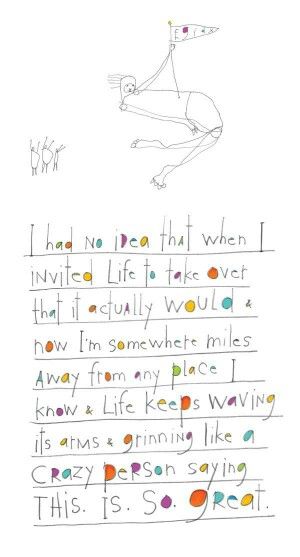 There is a graphic artist named Brian Andreas whose work I can’t really describe to you. He uses a lot of primary colors, representational but non-realistic images, and words to create prints called “StoryPeople.” In one of them that I saw a while back is this quotation (I don’t know if it’s original to Mr. Andreas or quoted from someone else):
There is a graphic artist named Brian Andreas whose work I can’t really describe to you. He uses a lot of primary colors, representational but non-realistic images, and words to create prints called “StoryPeople.” In one of them that I saw a while back is this quotation (I don’t know if it’s original to Mr. Andreas or quoted from someone else):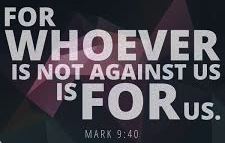 Today the Lectionary gives us what, at first glance, are two stories about leadership, but what they really are are stories of people trying to protect God (or God’s appointed leader) in inappropriate ways
Today the Lectionary gives us what, at first glance, are two stories about leadership, but what they really are are stories of people trying to protect God (or God’s appointed leader) in inappropriate ways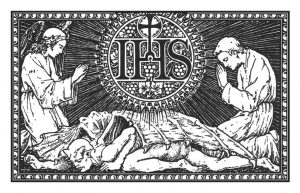 Today on the secular calendar is New Year’s Day, but that’s not true in the church. We celebrated a new church year several weeks ago on the First Sunday of Advent. In the church, January 1, being eight days after the Feast of the Incarnation, is the day on which we celebrate Jesus’ Jewishness. We call it, these days, the Feast of the Holy Name of Jesus; it was formerly called the Feast of the Circumcision of Christ because that is what Luke’s Gospel tells us was done. It was a very Jewish thing to do.
Today on the secular calendar is New Year’s Day, but that’s not true in the church. We celebrated a new church year several weeks ago on the First Sunday of Advent. In the church, January 1, being eight days after the Feast of the Incarnation, is the day on which we celebrate Jesus’ Jewishness. We call it, these days, the Feast of the Holy Name of Jesus; it was formerly called the Feast of the Circumcision of Christ because that is what Luke’s Gospel tells us was done. It was a very Jewish thing to do. When Philip told Nathanael that he had found the Messiah and that he was the son of a carpenter from Nazareth, Nathanael’s immediate response was, “Can anything good come from Nazareth?” (Jn 1:46). Obviously Nazareth had a reputation, and not a good one. I often wonder if, as Jesus was making his way through the Holy Land, especially early in his ministry when he wasn’t well-known, people would ask him, “What was it like growing up in Nazareth?”
When Philip told Nathanael that he had found the Messiah and that he was the son of a carpenter from Nazareth, Nathanael’s immediate response was, “Can anything good come from Nazareth?” (Jn 1:46). Obviously Nazareth had a reputation, and not a good one. I often wonder if, as Jesus was making his way through the Holy Land, especially early in his ministry when he wasn’t well-known, people would ask him, “What was it like growing up in Nazareth?”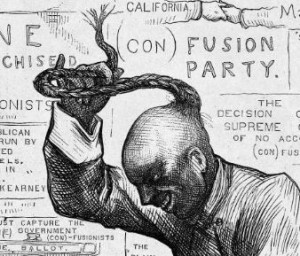 Believe it or not, I’ve actually had the last of these selected verses quoted to me as part of an argument against the use of incense in the church. I was in a conversation with someone about our use of incense in “high church” liturgies, being told (among other things) that incense was fine when we were younger and acting like hippies but now that we are older and mature we should put aside such childish ways, when this chestnut was pulled out. Since I’ve studied the Old Testament (as most clergy have) I knew my critic was misusing the text.
Believe it or not, I’ve actually had the last of these selected verses quoted to me as part of an argument against the use of incense in the church. I was in a conversation with someone about our use of incense in “high church” liturgies, being told (among other things) that incense was fine when we were younger and acting like hippies but now that we are older and mature we should put aside such childish ways, when this chestnut was pulled out. Since I’ve studied the Old Testament (as most clergy have) I knew my critic was misusing the text. Have you ever noticed how one of the most common sorts of souvenirs to be brought back from a trip is food? Every time we travel, my wife and I, we bring back food. Sometimes the authorities thwart us, but we try.
Have you ever noticed how one of the most common sorts of souvenirs to be brought back from a trip is food? Every time we travel, my wife and I, we bring back food. Sometimes the authorities thwart us, but we try.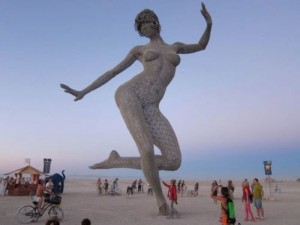 This morning I was struck by the absolutely opposite attitudes displayed in these two readings. The morning psalm invites God to try the worshipper; the first reading of the day demands the right to try God. I think these poles really do represent the spiritual pendulum on which most humans swing; they circumscribe our ambivalent and ambiguous relationship with the Almighty.
This morning I was struck by the absolutely opposite attitudes displayed in these two readings. The morning psalm invites God to try the worshipper; the first reading of the day demands the right to try God. I think these poles really do represent the spiritual pendulum on which most humans swing; they circumscribe our ambivalent and ambiguous relationship with the Almighty.  God had made it abundantly clear to Moses that he wasn’t going to be allowed to cross over into the Holy Land. He would be allowed to see the Promised Land from the opposite side of the river, but not to enter it. Despite Moses’ requests, God’s mind was not going to be changed, as this divine outburst of temper makes clear. ~ There have been times in my career – maybe I should say “careers”, because it was true when I was a businessman and when I was a lawyer, as well as during my ministry as a parish priest – that I have felt like Moses standing on Mt. Pisgah: I can see where this business, firm, community is (or ought to be) headed, but I am pretty sure I’m not going to get there with them. ~ A colleague and I once made note of a common occurrence in parish ministry: the aftermath of a building program. It seemed to us (and later we both personally experienced) that once a pastor has led a congregation through a building program and the building is up and running, the pastor leaves. Like Moses’ life, his or her ministry among that people is at an end. We were never sure why that was, and even having been through the experience I’m still not sure. ~ Moses (and his brother), of course, died without entering the Promised Land because of his lack of faith: the Lord said to Moses and Aaron, “”Because you did not trust in me, to show my holiness before the eyes of the Israelites, therefore you shall not bring this assembly into the land that I have given them.” (Num. 20:12) Is it because clergy lose faith (maybe faith in their communities) during a building program? Is it because the community loses faith in the clergy? I remember reading (several times) about how the stress of designing and building a home can be a cause of divorce; maybe something of the same dynamic is at work in the pastor/parish relationship during a church building program. ~ In any event, whether a building program or a change of ministry direction or a shift in church style, I’m pretty sure that every church leader (clergy and lay, I’m sure, but probably more the clergy) has felt, at some time, that he or she could see a vision of the church’s future that he or she was probably not going to be joining in. And if it hasn’t happened yet, I’m confident that it eventually will. When that happens, clergy, know that you are in good company! You are standing with Moses atop Mt. Pisgah!
God had made it abundantly clear to Moses that he wasn’t going to be allowed to cross over into the Holy Land. He would be allowed to see the Promised Land from the opposite side of the river, but not to enter it. Despite Moses’ requests, God’s mind was not going to be changed, as this divine outburst of temper makes clear. ~ There have been times in my career – maybe I should say “careers”, because it was true when I was a businessman and when I was a lawyer, as well as during my ministry as a parish priest – that I have felt like Moses standing on Mt. Pisgah: I can see where this business, firm, community is (or ought to be) headed, but I am pretty sure I’m not going to get there with them. ~ A colleague and I once made note of a common occurrence in parish ministry: the aftermath of a building program. It seemed to us (and later we both personally experienced) that once a pastor has led a congregation through a building program and the building is up and running, the pastor leaves. Like Moses’ life, his or her ministry among that people is at an end. We were never sure why that was, and even having been through the experience I’m still not sure. ~ Moses (and his brother), of course, died without entering the Promised Land because of his lack of faith: the Lord said to Moses and Aaron, “”Because you did not trust in me, to show my holiness before the eyes of the Israelites, therefore you shall not bring this assembly into the land that I have given them.” (Num. 20:12) Is it because clergy lose faith (maybe faith in their communities) during a building program? Is it because the community loses faith in the clergy? I remember reading (several times) about how the stress of designing and building a home can be a cause of divorce; maybe something of the same dynamic is at work in the pastor/parish relationship during a church building program. ~ In any event, whether a building program or a change of ministry direction or a shift in church style, I’m pretty sure that every church leader (clergy and lay, I’m sure, but probably more the clergy) has felt, at some time, that he or she could see a vision of the church’s future that he or she was probably not going to be joining in. And if it hasn’t happened yet, I’m confident that it eventually will. When that happens, clergy, know that you are in good company! You are standing with Moses atop Mt. Pisgah!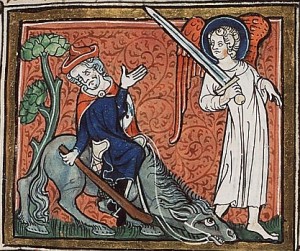 We’ve been following the story of Balak and Balaam from the Book of Numbers for a few days, although I’ve not been writing about it here. In truth, I find it a little dull. But Balaam’s words this morning strike me as pertinent to what’s going on in my denomination (the Episcopal Church) in Indianapolis this week: “What the Lord says, that is what I will say.” Balaam will not simply parrot whatever blessing or curse Balak wants; he will say what he understands God to want him to say. ~ A lot of resolutions are being debated at the General Convention and many of them will be referrals to standing or special committees and task forces with instructions for study and report. That’s all well and good, some actions of the church need study and careful consideration before they are taken. But all too often these referrals are not for disinterested and unbiased reflection. Take, for example, the question of whether the church should bless the committed relationships of couples who are of the same sex (“same-sex marriage” as some call it). ~ Before I continue, I need to be on record as believing that the church should offer such blessings, just as we do for committed couples of opposite sexes. ~ It is likely that some committee (the Standing Liturgical Commission, probably) will be asked to study the question of our theology and understanding of marriage. Good. But it will probably, in the same resolution, be tasked (in fact, I think there’s a resolution pretty much saying) to report back with suggested liturgies for such blessings. Bad. The outcome of the theological study is simply presupposed in the task! This isn’t a resolution to study the theology of marriage; it’s a resolution to provide a theological justification for same-sex marriage. ~ I suspect that another issue before the Convention, whether Holy Communion should be open to those who are not yet bapized members of the Christian faith, will result in a similar “study-and-report” referral. ~ Committees and task forces asked to do that should not also be given the job of preparing materials which can only be based on a pre-supposed outcome. When the Convention does so, it stands in the same position as Balak demanding that Balaam utter the blessings and curses of his choosing. Committees and task forces need to be free, like Balaam, to say not what the General Convention presupposes they will say, but what they understand God wants them to say. ~ By the way, Balaam had a donkey who could see angels and who tried to steer him away from danger. Most committees also have an ass or two who can do the same thing; pray God they do their job! ~ (Parenthetical closing remark: I don’t otherwise suggest that our committees emulate the confused, untrustworthy, and idolatrous Balaam, a man whom Peter described as being one who “loved the wages of iniquity” [2 Peter 2:15]. But insofar as he spoke God’s message without bias, go for it!)
We’ve been following the story of Balak and Balaam from the Book of Numbers for a few days, although I’ve not been writing about it here. In truth, I find it a little dull. But Balaam’s words this morning strike me as pertinent to what’s going on in my denomination (the Episcopal Church) in Indianapolis this week: “What the Lord says, that is what I will say.” Balaam will not simply parrot whatever blessing or curse Balak wants; he will say what he understands God to want him to say. ~ A lot of resolutions are being debated at the General Convention and many of them will be referrals to standing or special committees and task forces with instructions for study and report. That’s all well and good, some actions of the church need study and careful consideration before they are taken. But all too often these referrals are not for disinterested and unbiased reflection. Take, for example, the question of whether the church should bless the committed relationships of couples who are of the same sex (“same-sex marriage” as some call it). ~ Before I continue, I need to be on record as believing that the church should offer such blessings, just as we do for committed couples of opposite sexes. ~ It is likely that some committee (the Standing Liturgical Commission, probably) will be asked to study the question of our theology and understanding of marriage. Good. But it will probably, in the same resolution, be tasked (in fact, I think there’s a resolution pretty much saying) to report back with suggested liturgies for such blessings. Bad. The outcome of the theological study is simply presupposed in the task! This isn’t a resolution to study the theology of marriage; it’s a resolution to provide a theological justification for same-sex marriage. ~ I suspect that another issue before the Convention, whether Holy Communion should be open to those who are not yet bapized members of the Christian faith, will result in a similar “study-and-report” referral. ~ Committees and task forces asked to do that should not also be given the job of preparing materials which can only be based on a pre-supposed outcome. When the Convention does so, it stands in the same position as Balak demanding that Balaam utter the blessings and curses of his choosing. Committees and task forces need to be free, like Balaam, to say not what the General Convention presupposes they will say, but what they understand God wants them to say. ~ By the way, Balaam had a donkey who could see angels and who tried to steer him away from danger. Most committees also have an ass or two who can do the same thing; pray God they do their job! ~ (Parenthetical closing remark: I don’t otherwise suggest that our committees emulate the confused, untrustworthy, and idolatrous Balaam, a man whom Peter described as being one who “loved the wages of iniquity” [2 Peter 2:15]. But insofar as he spoke God’s message without bias, go for it!)

